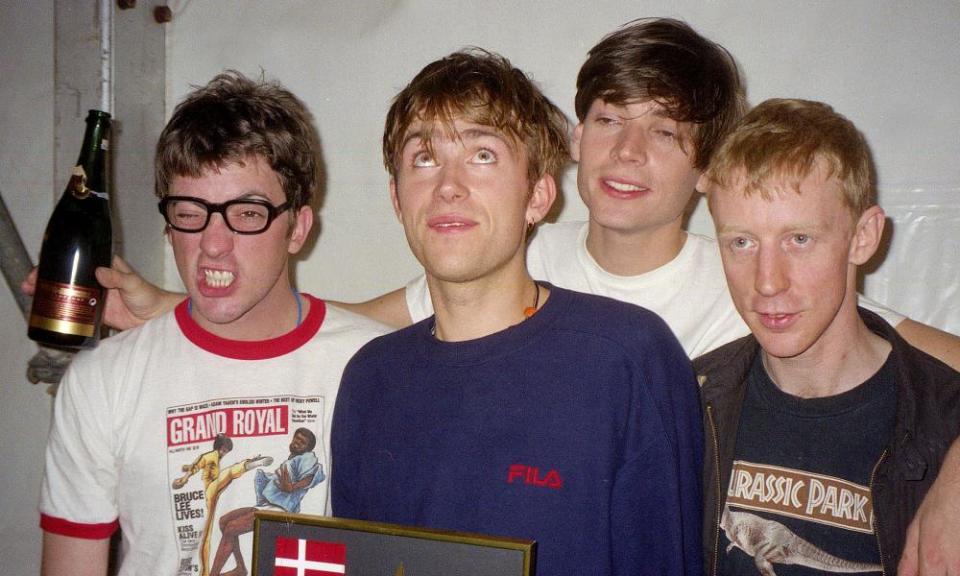Verse, Chorus, Monster! by Graham Coxon review – Britpop’s unlikely lad

As Blur bossed the 90s, and Damon Albarn’s bouncy songs about Englishness came to exemplify Britpop, Graham Coxon could usually be found scowling at the back of the band’s group shots. Coxon’s MO as their guitarist often involved lobbing “anti-solos” into the machinery, the band’s sceptical counterweight.
The two had met at school in Colchester, Essex, decamping to art college in London where they found themselves at the centre of two creative movements: the Goldsmiths’ art set that would become the YBAs, and the bands who would spearhead a new sound. One glance at the music press back then would have revealed that Coxon, bespectacled, sharp and into American music as much as the Kinks, was not always thrilled at his band’s direction of travel.
The more chirpy Blur’s singles became, the less apparent was the band’s arched eyebrow, or their bucolic, bittersweet undercurrents, or their wide range of influences. One flashpoint was Blur’s 1995 hit Country House – ostensibly a satire on success – and its Damien Hirst-directed video. As the band larked about with arch-lad Keith Allen while buxom young women pastiched Benny Hill, Coxon felt the band’s sense of irony looping back on itself.
It is a surprise – or possibly no surprise at all – that Coxon only reports music being any fun more than 200 pages in
His discomfort with sexism – and success – was played out in interviews. Coxon’s then-partner was in the riot grrrl band Huggy Bear and at the height of Blur’s fame, Coxon retreated from “high street Blur” into the grassroots DIY punk scene. Other tensions tugged at Blur – both Coxon and drummer Dave Rowntree struggled with alcoholism. Coxon entered rehab in 2001, and the rest of Blur made their album Think Tank without him.
All this is a matter of public record. Written with the journalist Rob Young – author of Electric Eden, a primer on British folk music’s transporting qualities – Coxon’s memoir does not reveal anything very new about a much-catalogued era.
It does, however, retell a set of familiar tales – Britpop, the madness that is fame, band strife, addiction – with disarming candour. Coxon can be lyrical when talking about the music he loves – from the Who to obscure US band Mission of Burma – but his tone is mostly matter-of-fact. There is a refreshing innocence to his prose when talking, for example, about the much-maligned 12-step programme. “No one teaches you this stuff,” he riffs – chiefly, navigating success and relationships.

It is a surprise – or possibly no surprise at all – that Coxon only reports music being any fun more than 200 pages in, when he tours the short, sharp songs of his fifth solo album with a band of friends in small venues. Hilariously, Coxon the naysayer does actually exhibit some rock star behaviour. He lives in a very big house in the country, for a time (mostly as a hermit, walking the bounds in his pants). He tinkers happily with vintage motorbikes. He gets into spiritualism and Wicca. He moves to LA (but quickly returns). Fender makes a Telecaster in his honour.
A recent piece in the Guardian noted the striking number of musicians in hardcore punk who had grown up as army kids. Born in Germany, Coxon also moved around bases, living the kind of unsupervised 1970s childhood full of sharp edges and casual violence that seems heart-rending now. Raised in Derbyshire and not rich, Coxon was particularly vexed when Blur were cast as posh southern kids to the more hardscrabble Oasis.
In art, Coxon found a means of exorcism as well a stylistic exercise. (He mostly drew monsters.) In music, though, he found a tribe, and in alcohol, a balm for his deep-rooted anxiety and the “constant buzz of embarrassment”. Verse, Chorus, Monster! was written during lockdown, after a lot of therapy; Coxon has been sober some years. You suspect Rob Young was chosen as a sounding-board because some time ago – certainly in time for his 2009 album, The Spinning Top – Coxon fell hard for the open tunings and complex finger-work of folk revival guitarists such as Bert Jansch and Martin Carthy. Like the feminist punk scene in the 90s, folk was another tribe from which Coxon (the notional “pop star”) expected a rebuff. Instead, he found acceptance. Verse, Chorus, Monster! breaks off with Coxon, a classically tortured musician, on a blessedly even keel.
Verse, Chorus, Monster! by Graham Coxon is published by Faber (£20). To support the Guardian and Observer order your copy at guardianbookshop.com. Delivery charges may apply

